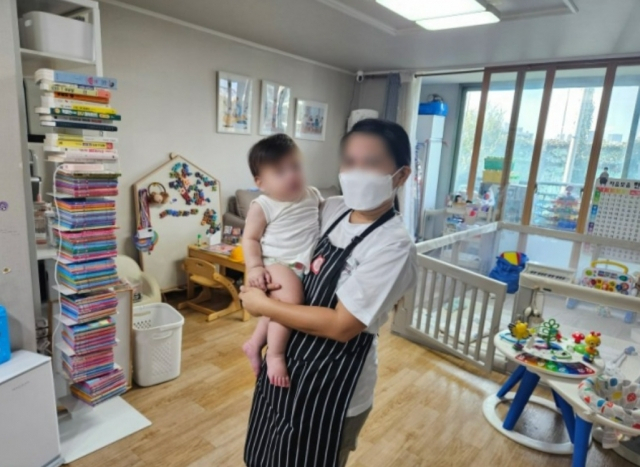 |
A Filipino caregiver takes care of an infant in a home in Seoul. (The Seoul Metropolitan Government) |
As Seoul's six-month foreign caregiver pilot program marks its first month on Thursday, significant unresolved issues -- particularly over pay.
The initiative, led by the Seoul Metropolitan Government and the Ministry of Employment and Labor, aims to offer affordable child care and light and incidental help with housework. The six-month pilot, limited to Seoul households, primarily dual-income with multiple children, and employing only Filipino national women aged 24-38, began on Sept. 3 with 100 workers.
The Seoul Metropolitan Government has said the pilot program has yielded promising results in its first month. The nannies themselves have been commended for their hard work and English proficiency. The selected households also find the service more affordable than hiring local caregivers, according to Seoul city.
However, the program has faced problems. On Sept. 15, just two weeks after starting work officially here, two Filipino caregivers disappeared from their accommodations in Yeoksam-dong and have not returned as of Thursday. If they fail to return, program regulations stipulate they will be classified as unregistered.
The Ministry of Employment and Labor has suggested that the disappearances of the two caregivers may be linked to dissatisfaction with wages. While the caregivers are paid the minimum wage, they could potentially earn more in other jobs. In particular, some manufacturing employers, struggling with labor shortages, are reportedly offering higher pay to attract and retain workers.
This incident has also reignited the controversy over how much the nannies are paid. While the Labor Ministry says the pay may be too low to keep the nannies in the system, others complain it is too high for many families to afford.
There have been persistent calls from ruling People Power Party politicians for changes to be made to allow them to be paid below the minimum wage.
"In Hong Kong, the cost for foreign domestic workers starts at 830,000 won ($622) monthly, and in Singapore, it's between 480,000 and 710,000 won," Seoul Mayor Oh Se-hoon said at a seminar in late August. "In Korea, if we adhere strictly to minimum wage laws, I'm not certain this program will sufficiently benefit those (on low incomes) who wish to hire caregivers."
However there is also strong opposition to lowering wages, including from within the government.
Labor Minister Kim Moon-soo, during a press briefing at the Government Complex in Sejong on Monday, also stated, "Currently, the minimum wage is applied to these workers, and despite this, two have disappeared. If we were to offer even lower wages, it would likely result in more workers leaving, thereby jeopardizing the program's sustainability."
Kim emphasized the differences between South Korea and city-states like Singapore, noting, "Unlike in those countries, where managing undocumented residents is relatively straightforward due to their small size, managing undocumented residents is challenging in Korea due to the country's large size."
Kim also noted that not applying the minimum wage standards to foreign workers due to their nationalities contradicts international norms, such as those outlined in the International Labor Organization's Convention 111, as well as domestic laws including the Labor Standards Act and the Act on the Employment of Foreign Workers.
Labor groups have called for a comprehensive reassessment of the program's expansion.
The Federation of Korean Trade Unions, one of the country's two major umbrella unions, issued a statement in September, criticizing the government for its "hastily executed initiative, lacking adequate preparation and consultation."
The organization warned that "even when workers are paid the minimum wage, they are leaving. If wages are lowered further, even more workers will leave."
The Labor Ministry has consistently stated its intention to fine-tune the policy after the six-month pilot, carefully monitoring the program's progress. This evaluation could pave the way for a possible expansion in the future.







![[Today’s K-pop] Blackpink’s Jennie, Lisa invited to Coachella as solo acts](http://res.heraldm.com/phpwas/restmb_idxmake.php?idx=644&simg=/content/image/2024/11/21/20241121050099_0.jpg)